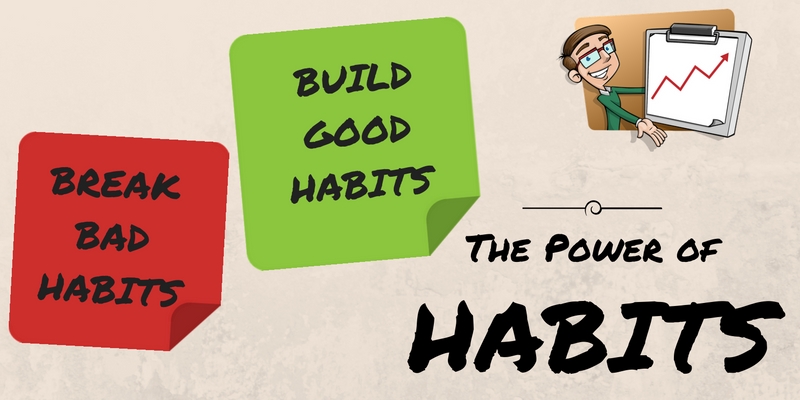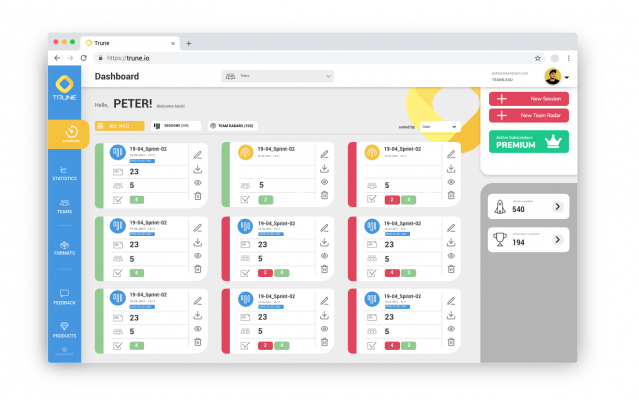A habit is something that you do often and regularly, sometimes without even knowing that you are doing it. The great thing about habits is that you can train yourself to make yourself execute certain tasks regularly without even thinking.
Everyone of us has millions of habits, good ones and bad ones. And they are triggered by certain events in life.
For instance, did you brush your teeth today in the morning? You might not even remember that you did it, because it is a habit. You don’t even have to think about it, it is just part of your morning routine and triggered automatically when you wake up.
You almost need no will power to execute a habit
The great thing about a habit is that you almost need no will power to execute it. That’s why they are so powerful.
If you can make a task to a habit, which you know will help you on a long term, then you almost need no will power to consistently execute it.
For example, if you want to learn playing the piano and you make practicing it to a habit, then you don’t need any will power to get yourself in front of the piano to practice.
Or if you want to eat healthier and you make it to a habit, then you don’t have to spend your limited will power every day in overcoming the temptation to not eat chocolate. It will go automatically without even thinking.
But how do you create habits then?
Creating habits is not so easy, but if you do it regularly, then it is getting easier over time.
I was recently listening to the audio book “Superhuman By Habit” by Tynan. I highly recommend this book to everyone, who wants to learn more about habits.
Tynan explains in his book that there are two phases to build habits, the loading phase and the maintenance phase.
The loading phase
In the loading phase you want to teach yourself a new habit. Therefore you have to execute the task every day in the same routine.
For instance, after you come home from work you play the piano for 5 minutes every day.
This requires a lot of discipline and you have to constantly remind yourself to do that. For example, you can set an alarm on your phone or put a sticky note on the piano so you won’t miss it when you come home from work.
In the loading phase it is very important to execute the task always, even though your motivation might be down.
If you will really miss it once, then plan your next day in a way that it ensures you will execute the task. Because if you miss it more then once, then you basically have to start over again with the loading phase.
The maintenance phase
After the loading phase your habit is part of your daily routine and you can switch to maintenance phase.
You have built your habit to an extend that it requires almost no will power anymore to execute the task. It is automated and you don’t even have to think about it anymore.
When to switch to maintenance phase?
In general you cannot predict how long it will take to build a habit. It depends on the person itself and also on what exactly you want to train yourself to become a habit.
To find out, whether you have successfully built your habit or not, you have to ask yourself following question: “If I stop the loading phase today, would something change?”
If you answer the question with “No”, then you have built your habit. If you expect yourself to fall back to the old routine within a few days or weeks, then keep on going with the loading phase.
More flexibility in maintenance phase
According to Tynan you can allow yourself to be a bit more flexible, when you have successfully built your habbit.
For instance, you can train yourself to eat no junkfood at all. During the loading phase you are, of course, not allowed to go to McDonalds for a burger. Such a loading phase might take up to several years to built the habbit.
Afterwards, in maintenance phase, you can still stick to your plan, but be a bit more flexible. You can allow yourself to break the rule every now and then, as long as it is only exceptionial. Let’s say, that you can agree with yourself that you are allowed to eat at McDonalds, but only on Sundays and with your friends.
Drifting off
Over time though, you are going to drift off from your schedule. So you have to pay attention over the coming month and years and take correcting actions when you realize that you have drifted too much.
Benefits of good habits
As I already mentioned, the awesome thing about habits is that they don’t need any willpower to be executed. You are executing them automatically without putting a lot of thought in it.
It is of course quite some effort to built good habits. But even if the loading phase will take several years, you will have this habit most likely for the rest of your life. So investing a few years is still only a little effort compared to what you gain for the several decades afterwards.
Until now I was only talking about good habits. But you can also have bad habits. You can do things, which are bad for you, but you might not even really notice doing it.
Destroying bad habits is a chapter of it’s own. I am going to talk about it in one of the upcoming posts.
For now, let me know in a comment, for which daily tasks do you want to built habits? Is there anything, which would require a short amount of time per day, but you still are not able to consistently do it?
Ok, that’s it. I wish you a great day. Stay tuned and HabbediEhre!

